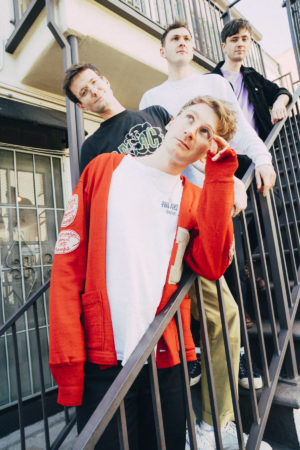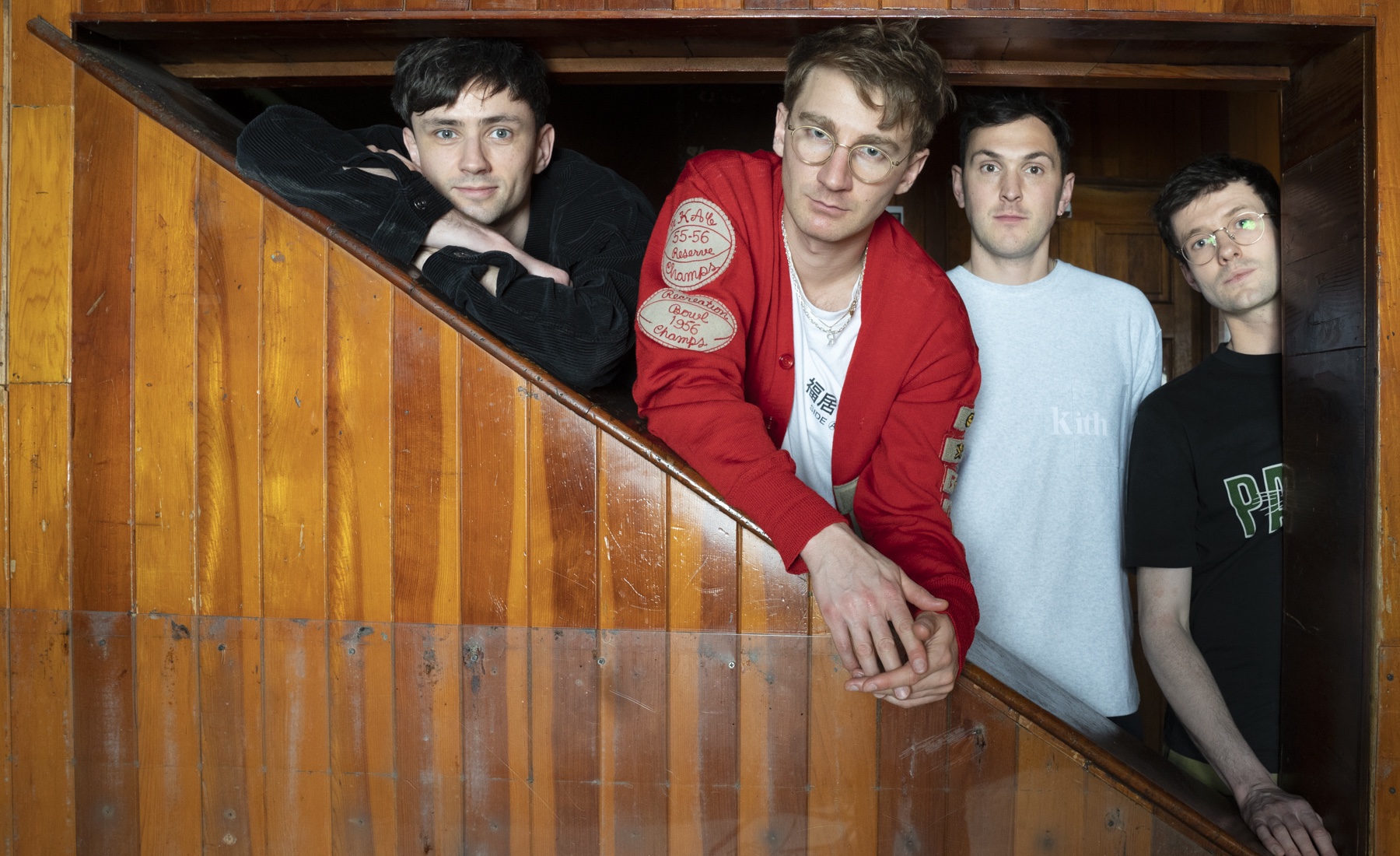It’s March 11, 2020. Glass Animals are about to play the Troubadour in West Hollywood, just as the entire world is about to change.
On this day, the NBA suspended the entire season after Utah Jazz center Rudy Gobert tested positive for the coronavirus. Holed up in Australia, Tom Hanks and Rita Wilson revealed that they, too, tested positive for the virus, and were remaining quarantined in Queensland. President Trump restricted travel from Europe to prevent further spread of the disease. At the time, there were more than 1,200 confirmed cases of COVID-19 in the United States, and more than 100,000 globally.
In California, Glass Animals are moving through the motions of their Déjà Vu Tour. Like many, they were unsure of the state of things, but ready for the release of their third album, Dreamland, due out on July 10. But that evening, the Los Angeles gig would ultimately be the band’s last for the unforeseeable future as the world went into lockdown within the next twenty-four hours.
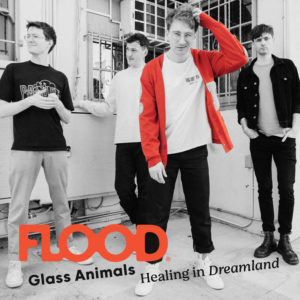
Cover design by Jérôme Curchod
Back home in the East London borough of Hackney, singer Dave Bayley is just a kid in a sweets shop.
He’s back in his comfort zone, hiding out in his home studio, concocting something new. Originally built around a spare bedroom, the studio is also where Dreamland was recorded. Settled in like a hermetic DJ, Bayley is planted in front of a keyboard as he catches up (post-corona outbreak) on a FaceTime interview. As he talks, he can’t keep his hands off the keys and tinkers around with Timmy Thomas’s 1973 soul single “Why Can’t We Live Together,” sampled on Drake’s 2015 hit “Hotline Bling.” Now that he has some time “off,” he wants to experiment with covers, having already released a rendition of Nirvana’s “Heart Shaped Box.”
Considering the circumstances, Bayley seems content. Surrounded by indoor palm trees and random tchotchkes keeping him amused, there’s a phosphorescent glow that has been surrounding Dreamland—first radiated in their “Your Love (Déjà Vu)” video, and now in the brand new “Dreamland” video shot by Bayley himself in his London apartment during quarantine using Zoom and printed instructions from director Colin Read.
After all, there’s something dreamy about Dreamland, which fits this thermal, glow stick theme. Bayley says it’s a bedroom album, drifting back to all those daydreams and reflections on making music in your room. “I’m kind of used to being stuck in this room,” he says. “I kinda like it in here. I got my palm trees. I’ve got all my toys. It’s a bit of a blackhole for me. I can spend months here and not speak to anybody, so it’s not so bad.”
London, like most dense cities, seems eerily unfamiliar during this pandemic. “I went on a run earlier, and everyone’s running in a line and keeping their distance, and then someone cycles past, and everyone’s shouting at them,” says Bayley. “It’s like some kind of zombie land.”
Yet, living in a partially desolate metropolis isn’t the worst thing the band has been dealt at this point. Prior to the COVID outbreak, Bayley, drummer Joe Seaward, bassist Ed Irwin-Singer, and guitarist and keyboardist Drew MacFarlane lived through a personal tragedy, an accident that ended their 2018 tour, ultimately led to Dreamland, and nearly cost one of them their life.
“I had no idea what was going on for awhile,” says Seaward, who along with Bayley, first caught up with FLOOD in February prior to their Brooklyn concert. “It’s been quite a journey, a very unexpected one, and it started off pretty bad.”
Reflecting on the past two years is something Seaward is capable of doing now. At times, he can’t believe he’s still here. On July 2, 2018, Seaward was struck by a truck while riding a bike in Dublin and suffered a fractured skull and a broken leg. He had no idea what was happening for quite some time because he couldn’t remember.
“I’m kind of used to being stuck in this room. I kinda like it in here… It’s a bit of a blackhole for me. I can spend months here and not speak to anybody, so it’s not so bad.” — Dave Bayley
“The next year or so was quite an experience, because the healing process was an amazing thing to see from the inside out,” says Seaward. “You find out who your friends and family really are and what the human body can do, and the things medical professionals can do that you sort of take for granted. And I did it with these guys, which was really amazing.”
After five months in recovery, Seaward eventually attempted to play again, starting on a drum pad. “Being back and being able to do things that I didn’t know if I would ever be able to do again feels special,” says Seward. “It’s one of those things that when it’s taken away for a bit, you suddenly start to appreciate how lucky we all are.”
At Seaward’s side was Bayley from the first stage of his recovery—which was the scariest, as he had to learn how to think, speak, read, and walk again. “[Bayley] was helping me come to grips with what was going on, learning to speak and walk and read and all of these things that I suddenly couldn’t do,” says Seaward. “It took different amounts of time. Learning to speak again happened quite fast.”
Bayley interjects, “You texted pretty fast.”
“Yes, I sent lots of texts of complete nonsense, mainly to people who had no idea what had happened,” laughs Seaward. “I was trying my best.”
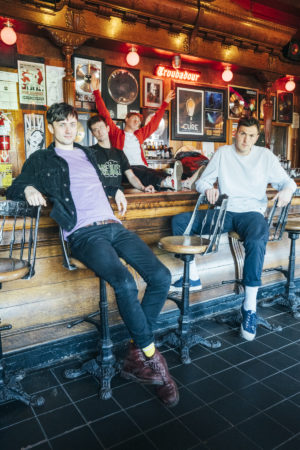
Throughout the next year, everything slowly came back to Seaward. In its aftermath, Seaward believes the accident affected him more mentally than physically. “I don’t know if I’ll ever be the same again, or normal,” he says. “I don’t know what normal was, really. It’s less physical and more of a kind of mental thing—learning to trust yourself again and the things that you used to take for granted. Right now, I feel really good and able and excited. I’m ready for the next chapter that is upon us.”
Glass Animals’ next chapter is in Dreamland.
Dreamland, mostly comprised of hip-hop, trance, and pop beats, is named after a state of being Bayley says he’s been stuck in for some time. Growing up in Texas, Bayley remembers his sassy Southern teacher Mrs. Brooks, who often had to snap him awake, reminding him he was somewhere off in “dreamland.” This always stuck with him. “I was always spaced out as a kid,” he says. “I was always on a totally different planet. My mum used to say I was in la la land.”
Sitting in the hospital waiting around for hours during Seaward’s recovery brought Bayley right back to dreamland and thinking up songs, amid the fear of possibly losing his friend. A year earlier, Bayley says he lost another friend, and was now afraid of losing Seaward.
“The healing process was an amazing thing to see from the inside out. You find out who your friends and family really are and what the human body can do… And I did it with these guys, which was really amazing.” — Joe Seaward
“Your brain goes to all these totally ridiculous places you never thought it would end up going again,” says Bayley. “You’re remembering all these things—good things, bad things, sad things, confusing things—and tiny little things that someone said to you that changed your entire life. The conscious part of your brain that’s keeping you alive during the day is too tired to function, so it’s nice just to let that dreamland take over.”
Like a storybook tale, “Dreamland” chimes in, floating through its lo-fi state in lyrics like, “Make it feel like a movie you saw in your youth / Make it feel like a song that just unopened you.” Ruminating through different chapters, the title track acts as Dreamland’s summary with each line attaching to another track.
“You do get very reflective, and I started thinking about everything that’s happened in life,” says Bayley. “When you have that much time and you’re quite tired, everything from the past kicks in, and you start analyzing things, and you’re thinking about how lucky you are to have had all of these experiences and what you’ve learned from them all.”
Naturally, some lighter tracks tend to have darker meaning. “It turns out I’m also quite dark,” jokes Bayley. “You’re in a weird state, and you realize how vulnerable you are and how quick everything can be gone, so that was kind of the start of the process. As Joe’s skull was fusing back together over the next couple of months, and after being by his side, I went to do some writing.”
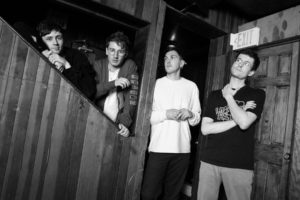
Working his way through Dreamland, Bayley went to Los Angeles to write, while also taking on some production projects in between. Falling into somewhat of a self-reprimanding state, he started thinking about forgiveness—toward people who have wronged him, and for things he’s done to others. “I was remembering the worst things I’ve ever said to people that irreparably damaged our relationship, and just forgiving [myself] for those things,” says Bayley.
Transfixed in thick synths and affecting lyrics, the moodier “It’s All So Incredibly Loud” taps into that split second when you’re about to say something to someone that will forever change their lives. “If you’ve ever said something that you know is going to break that person, then you say it, and it’s almost like an out-of-body experience, and it feels like it’s not you saying it…but then it comes out,” says Bayley. “It’s about the three seconds between you saying it, and then there’s that silence—but it’s also the loudest thing that’s ever happened in your life.”
The album was almost entirely produced and written by Bayley, with the exception of “Your Love (Déjà vu),” which was co-produced by Paul Epworth—who has worked with the band since their 2014 debut ZABA and its follow-up, 2016’s How to be a Human Being—and “Tangerine,” which was co-written with singer/songwriter Starrah. The lack of outside help makes sense, as Dreamland goes deeper, to a place only Bayley and company could decipher.
“As Joe’s skull was fusing back together over the next couple of months, and after being by his side, I went to do some writing.” — Bayley
Deeply introspective, Dreamland transports back to old friends, places, and moments in time. “It feels like the most Dave album, the most Dave music that we’ve written together as a group,” says Seaward. “It’s a combination of the lyrical side, which is like more personal, but also the musical side. It certainly feels like there’s an essence of Dave through everything.”
In its ambient trip-hop beats, “Space Ghost Coast” is about one of Bayley’s childhood friends who he later discovered planned a shooting and was caught after trying to bring a gun into a local school. “It’s when someone who you think you’ll always trust, even if you’re not in contact, does something that you think is unspeakably horrible and you can never forgive them,” says Bayley. “It’s thinking back on that, and how someone can change so much in such a short time.”
Relationships are further dissected on “Helium.” Softly syncopated, the track penetrates through fragmented relationships often built on traumatic foundations. “I think it’s so beautiful, lyrically,” says Seaward. “It’s the strongest piece, and the most emotive poetry that Dave’s ever written. It’s evocative and was quite moving for me.”
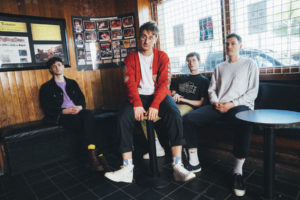
Offering some levity, “Tangerine” lifts Dreamland into a more playful space. Bayley says it’s about when someone you’ve known and loved for a long time begins to change for one reason or another, but you can still see those tangerine dots in their eyes from time to time, a glimmer of who they used to be. “Maybe it’s something they say or do,” he says. “So you keep being attached to this person, this old version of the person that’s actually kind of a wanker now.”
Skipping beats ricochet off the lovelorn, dance-y “Heat Waves” and the cheekier “Melon and Coconut,” a track Bayley says has this natural flow. “I just like how that one came out, just fast and really fun,” he says. “There’s a spontaneous charm about it, and then we tried to fuck with it—like, put a big beat under it and stuff—and that didn’t really work, so we just left it in super demo form.”
“It feels like the most Dave album, the most Dave music that we’ve written together as a group” — Seaward
When recording “Melon and Coconut,” Bayley accidentally left his security camera on and found himself with nearly two hours of footage of him putzing around his studio. “I watched it back the other day,” he says. “I’m sitting there with my feet up playing the guitar and singing into a microphone. Maybe we need to cut that up for a video. I do some weird shit.”
No collaborations, just the four of them, was always the modus operandi for Glass Animals since their inception, but they made an exception on Dreamland, bringing in rapper Denzel Curry on its first single, “Tokyo Drifting.”
Bayley had an instant connection with Curry: Both grew up in America around the same time, watched the same movies, and ate the same food. “It was weird because there were a lot of parallels in our lives,” says Bayley. “I had been into his music since his first project [Nostalgic 64], and I just thought if we’re going to put a featured artist on an album, it should be him.”
In the studio, Bayley is continuously contemplating everything around Dreamland, including the band’s live shows. Working around their longtime philosophy that “everything live is live,” never using backing tracks and letting the “shit hit that fan” when playing songs for the first time, transferring their sonic sound live is an element Glass Animals have managed to perfect in the past six years.
Moving in a more theatrical and interactive direction, Bayley says they would like to experiment with more virtual components, like augmented reality to fully immerse concert goers from the moment they enter a venue. “I want for people, as soon as they walk out of their car or the bus station or the tube station near the venue, to be in the realm of the album,” he says. “You can transform the whole venue and make it a whole pre-show, when everyone is sitting in a room listening to music. That’s people’s time, so why not do something with it? It’s also making the show less of a ‘We’re on a stage and you’re in a crowd’ situation, which is pretty standard these days.”
Once COVID-19 is under control, the band will reconvene for tour. Seaward is home in Oxford and admits he’s going a little stir crazy, feeling a sense of detachment from everything. “I feel very out of the loop,” he says. “It’s just a weird time to be alive. I feel this underlying sense of panic.”
As they prepare to release Dreamland, the lockdown is serving a purpose. There’s time to produce more videos, and connect more with fans on social media platforms. Meanwhile, Bayley is making new music, recording more Quarantine Covers. He recently released his rendition of Lana Del Rey’s “Young & Beautiful,” paid tribute to Bill Withers with “Lean on Me,” and finally pulled together “Hotline Bling,” with Arlo Parks.
“I guess we have a bit more time to think about things,” says Bayley. “Sometimes you get a bit rushed and you try to cram everything in and get prepared for the album to come out. Now there’s actually a bit more time to think about it all and really get things ready. Everyone is ready for music again.” FL
